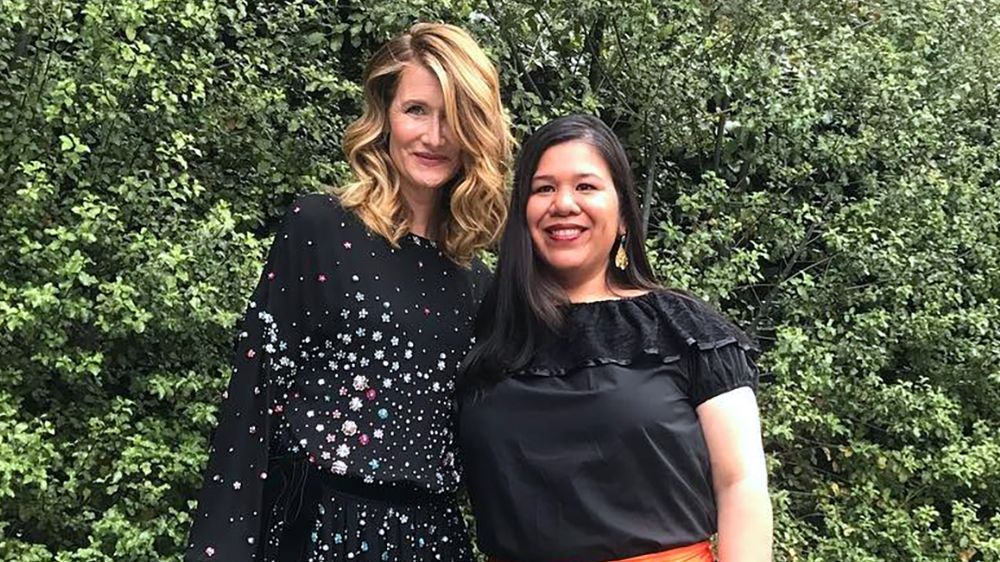Laura Dern in Conversation With Mónica Ramírez About the Border Crisis
A discussion about how the situation developed—and what we can all do to help.

Many of us have seen the pictures: children in cages with mylar blankets that look like they’re made out of aluminum foil. We’ve read the reports: Children have died in custody and experienced violence while in the government’s care, the current administration’s recently-announced plans to hold migrant children at a base that served as a World War II Japanese internment camp. But in the face of this crisis, we’ve also seen an outpouring of grassroots activism by Americans from all walks of life, mobilizing to draw attention to the humanitarian crisis at the border.
I’m one of them, and I can trace my journey to meeting Mónica Ramírez, a lawyer and activist who I met through TIME’S UP. Immigration and asylum laws are complicated, and I’m grateful to have access to an expert with such a depth of knowledge on the issue. So, in order to understand exactly what’s happening at the border, I decided to turn the tables on Monica and interview her.
Here’s our conversation.
Laura Dern: Thanks for taking the time, Mónica. I meet so many people who don’t understand what’s happening at the border, or how many women and children have been impacted. Can you help break this down?
Mónica Ramírez: Thanks, Laura. You’re not alone, the situation on the ground is complicated. Let’s start at the beginning—the root causes of migration. It’s simple: You don’t undertake this type of dangerous journey unless you are fleeing awful circumstances. Many times, parents are running for their lives in the hope of providing a better life for their children.
Gender-based violence and sexual violence against migrant women and girls is an endemic problem, and we’ve seen a significant increase in violence against these women in the past five years. I remember one woman who was traveling with the caravan tell me that she had seen a loved one shot in front of her, and that the local gangs had threatened to make her daughters their girlfriends.
The point is, many of these parents feel that they have no alternative. Too often, the debate around migration doesn’t take into account the basic humanity of asylum-seekers, and that any person confronting abject poverty, a drought, and failed aid programs would undertake a journey like the ones we’re seeing today. For many of these families, there’s an overwhelming sense that there’s no other option.
Stay In The Know
Get exclusive access to fashion and beauty trends, hot-off-the-press celebrity news, and more.
LD: How does the asylum process work?
MR: In order for someone to be able to seek asylum in the United States, they have to enter the country and begin the process. But what many people don’t realize is that you do not have to request asylum immediately. You have up to one year after entering the US to request asylum.
LD: I don’t think that most people know that.
MR: Exactly. There’s a narrative out there that these families are breaking the law by entering the US. This is not accurate: The only way that they can seek asylum is by entering the US. So, in fact, they are following the established process to seek asylum.

Dern brought Ramírez as her date to the Golden Globes this year.
LD: So what’s changed?
MR: In April of 2018, former US Attorney General Jeff Sessions announced a policy called “zero tolerance,” which essentially criminalized those who didn’t enter the US through what’s known as a port of entry, claiming it was illegal. This allowed the government to charge adult migrants with a crime, and used that as a justification to rip them away from the children they were traveling with, because when you’re charged with a felony you can’t keep your kids with you.
What’s worse is that this was a policy that was intentionally designed to create the most harm—the idea was that it would deter people from coming to the US in the first place.
LD: So the “zero tolerance” policy led to the family separations?
MR: Yes. But it gets worse. We’ve since learned that the government did not have a way to track children and their families in order to reunite them. Some parents were deported without their children. Detained children were exposed to sexual and physical violence. Private companies are making millions of dollars off of this operation, and we’ve seen numerous studies outlining the profound psychological harm that child separation has on children.
LR: Didn’t you once tell me about a child who had to hold up their fingers to tell a judge how old they were?
MR: Yes, it was absurd. Some lawyers have shared stories and videos of small children—some of whom were even toddlers—who had to go before a judge to make their case alone, in a language they didn’t understand. I remember one attorney explaining to a judge that their client was fussy because they were a toddler.
LD: Trump signed an order to stop separating kids at the border after the backlash. What’s happened since then?
MR: What’s clear is that the government had every intention to put an inhumane policy into practice, and had zero intention to deal with the ramifications. He may have said that on paper, but the policy was so poorly implemented that it’s come to light that families were being separated before zero tolerance was first put into place.
It’s also come to light that many families have yet to be reunited. Worse still, in the past six months, six children have lost their lives in US custody. One was just 2 and a half years old. This week, another child has been added to these statistics. Óscar Alberto Martínez Ramírez and his 23-month old daughter Valeria drowned in Rio Grande as they were crossing from Mexico into Texas near Brownsville. Desperate waiting weeks in Mexico to seek asylum, they attempted to cross the river to present themselves to seek immigration relief in the US and perished in the process. Their tragic deaths point to the tremendous danger asylum seekers face on the US-Mexico border because of the crisis created by the Trump administration's policies.
When you keep young people in overcrowded, underfunded, freezing cage cities and provide poor medical care, it’s no surprise that people get sick—with deadly consequences.
LD: What can people do?
MR: Get informed. Go to a protest and to community events focused on addressing this issue. Call your member of Congress. Vote, and make sure all of your friends and family are registered. People can also donate to local organizations doing important work on the border. For every awful person who was behind these heartless policies, there are a lot of everyday Americans who are fighting back. And, maybe that next person who will join the fight is someone reading this conversation.
To register to vote or to check your registration, visit Vote.org. To find out who your representative is, visit House.gov. If you want to make a donation to those helping along the border, visit Justice for Migrant Women and Families Belong Together to make a donation. To find out more about the #ClosetheCamps protest on July 2, go here.
-
 Adria Arjona Smells Irresistibly Delicious Courtesy of This $48 Hair Oil
Adria Arjona Smells Irresistibly Delicious Courtesy of This $48 Hair OilPlus the makeup routine that helps her feel "like a rebel."
By Ariel Baker Published
-
 Princess Anne's Unexpected Suggestion About Mike Tindall's Nose
Princess Anne's Unexpected Suggestion About Mike Tindall's Nose"Princess Anne asked me if I'd have the surgery."
By Amy Mackelden Published
-
 Queen Elizabeth's "Disapproving" Royal Wedding Comment
Queen Elizabeth's "Disapproving" Royal Wedding CommentShe reportedly had lots of nice things to say, too.
By Amy Mackelden Published
-
 36 Ways Women Still Aren't Equal to Men
36 Ways Women Still Aren't Equal to MenFeatures It's just one of the many ways women still aren't equal to men.
By Brooke Knappenberger Last updated
-
 How New York's First Female Governor Plans to Fight for Women If Reelected
How New York's First Female Governor Plans to Fight for Women If ReelectedKathy Hochul twice came to power because men resigned amid sexual harassment scandals. Here, how she's leading differently.
By Emily Tisch Sussman Last updated
-
 Why the 2022 Midterm Elections Are So Critical
Why the 2022 Midterm Elections Are So CriticalAs we blaze through a highly charged midterm election season, Swing Left Executive Director Yasmin Radjy highlights rising stars who are fighting for women’s rights.
By Tanya Benedicto Klich Published
-
 Tammy Duckworth: 'I’m Mad as Hell' About the Lack of Federal Action on Gun Safety
Tammy Duckworth: 'I’m Mad as Hell' About the Lack of Federal Action on Gun SafetyThe Illinois Senator won't let the memory of the Highland Park shooting just fade away.
By Sen. Tammy Duckworth Published
-
 Roe Is Gone. We Have to Keep Fighting.
Roe Is Gone. We Have to Keep Fighting.How To Democracy always offers a path forward even when we feel thrust into the past.
By Beth Silvers and Sarah Stewart Holland, hosts of Pantsuit Politics Podcast Published
-
 The Supreme Court's Mississippi Abortion Rights Case: What to Know
The Supreme Court's Mississippi Abortion Rights Case: What to KnowThe case could threaten Roe v. Wade.
By Megan DiTrolio Published
-
 Sex Trafficking Victims Are Being Punished. A New Law Could Change That.
Sex Trafficking Victims Are Being Punished. A New Law Could Change That.Victims of sexual abuse are quietly criminalized. Sara's Law protects kids that fight back.
By Dr. Devin J. Buckley and Erin Regan Published
-
 My Family and I Live in Navajo Nation. We Don't Have Access to Clean Running Water
My Family and I Live in Navajo Nation. We Don't Have Access to Clean Running Water"They say that the United States is one of the wealthiest countries in the world. Why are citizens still living with no access to clean water?"
By Amanda L. As Told To Rachel Epstein Published